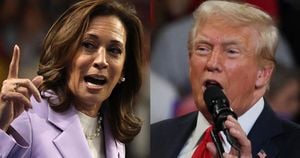President-elect Donald Trump's recent Cabinet nominations have sparked significant controversy, particularly due to numerous sexual misconduct allegations surrounding several of his picks, including himself. Amid rising scrutiny and public outrage, this situation highlights the administration's approach to candidates who have faced such serious accusations.<\/p>
Among the more talked-about nominees is Pete Hegseth, who has been selected as Trump's nominee for Secretary of Defense. Hegseth, formerly associated with Fox News, is facing allegations stemming from a 2017 incident where he was accused of sexually assaulting a woman after speaking at a Republican women’s event. The victim alleges Hegseth blocked her exit from his hotel room, forcing her to stay, and the encounter ended with her being injured. While Hegseth maintains the incident was consensual, he had previously settled with the woman as part of a confidentiality agreement, which his attorney Timothy Parlatore suggests was influenced by fears of losing his job during the #MeToo movement.
Details surrounding the allegation only surfaced more prominently within the last week when local officials returned to the records of the case. The Monterey County District Attorney’s office is involved, yet Hegseth has not been criminally charged. Hegseth's case is emblematic of a broader pattern: controversial nominees entering the Trump administration have often been met with accusations of sexual impropriety.
Alongside Hegseth, another troubling figure is Robert F. Kennedy Jr., nominated for the Secretary of Health and Human Services. He, too, has faced allegations of inappropriate behavior, including accusations of groping his former babysitter. Kennedy later sent the woman a text message apologizing for his behavior, claiming he had no recollection of the event. His past has not deterred Trump from selecting him for such an influential position.
Trump's former attorney general candidate, Matt Gaetz, was also embroiled in similar issues. Following accusations of sexual misconduct, which included potential connections to sex trafficking, Gaetz withdrew his name from consideration. He faced extensive investigations but has consistently denied wrongdoing throughout each inquiry. His situation raises questions about what thresholds Trump considers acceptable when selecting individuals for top positions.
Another nominee, Elon Musk, selected to improve the efficiency of government operations, has been sued by former employees at SpaceX for allegedly fostering a climate of sexual harassment. Like Gaetz, Musk has evaded significant repercussions so far, showing how accusations do not automatically disqualify individuals.
Further complicity has been witnessed with Linda McMahon, the nominee for Secretary of Education, facing allegations of facilitating environments prone to misconduct during her leadership at World Wrestling Entertainment. Despite clear accusations against her and her husband, who has similarly been criticized for toleration of abuse, McMahon continues to have backing from the administration.
While Trump himself has weathered numerous allegations over the years—including civil liability for sexual assault—these selections resonate with observers as messages from the top. Trump's history has made it evident he possesses little concern for the past behavior of those he surrounds himself with.
This trend not only raises eyebrows but sends strong signals about the administration's values. With nominees like Hegseth and Kennedy, there emerges recurring themes of power dynamics, gender exploitation, and public vulnerability. This pattern reinforces the message: credible accusations need not impede one's ascendance to significant government roles.
Supporters of Trump’s nominees argue their past conduct should not preclude their ability to serve effectively. Trump's communications team defended Hegseth, citing there have been no charges filed. Yet many critics argue these selections indicate the lowering of standards for leadership under Trump—a serious concern for the integrity of future governmental practices.
Observers wonder how such high-profile selections showcase potential conflicts with the broader aim of reducing systemic abuse within political structures. If individuals facing allegations and settlement agreements can rise to such power, critics fear it might embolden negative behaviors within those institutions and lead to more significant issues down the road.
The public’s response has not been uniform, with various factions backing the nominees who align ideologically with Trump and criticizing those deemed expedient yet troubled. The upcoming confirmation hearings will likely be divided, as the Senate debates the candidates and their pasts without substantial legal repercussions adding legitimacy to the concerns raised.
The revelations surrounding Trump’s nominees, particularly those with allegations of misconduct shadowing them, provide potent insights. They raise broader questions and conversations about accountability, the treatment of women, and the lengths to which individuals may go to secure power within the political spectrum. The ramifications of these appointments may have lasting effects, both culturally and politically, adding layers to the already complex dynamics surrounding Trump's presidency.



